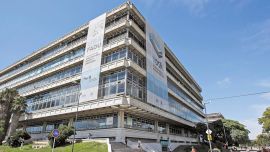Organised crime in Argentina takes on a particular shape, if one was to compare its experiences to other Latin American countries. “The idea of criminal organisations [in Argentina] is vague. When these terms are mentioned, the drug cartels in Colombia come to mind, but the reality of crime in Argentina is very different,” observes Rosario prosecutor Luis Schiappa Pietra.
The difference can be noted in many ways. For one, generally as a rule for most Argentine provinces, the lack of extreme violence perpetrated by criminal groups. In Colombiam for example, more than 11,000 people were murdered in 2022. On the other hand, little over 2,000 homicides took place in Argentina that same year. A recent report by the Insight Crime Foundation noted that the nation “does not suffer from the high levels of violence affecting other Latin American countries.”
A second difference, as detailed by CONICET Scientific Research Council experts Carolina Sampó and Ludmila Quirós in a recent paper (Criminal structures in Argentina and state cooperation initiatives to combat their progress), is that “criminal structures do not manage to control entire cities, but are centred on specific enclaves which are usually poorer areas, such as shantytowns." Across Mexico, different mafia organisations have schools, soup kitchens, hospitals and clubs under their control, in order to keep the support of local communities onside. In Veracruz or Tamaulipas, this is nothing new. “There have been several historic examples of criminal groups in Mexico providing necessities to local communities, especially during the recent coronavirus pandemic," reported Insight Crime.
In Argentina, most institutions are still running normally and the involvement of criminal groups is the exception. In other parts of Latin America, cartels have taken complete control of the territory, becoming an institutional authority on which communities depend. They not only run the drug business, they are involved in aspects as education, effectively becoming the State. Given the lack of state intervention, criminal organisations are positioned as the dominant hegemony, a turn of events which is “accepted” by communities.
This also exists in Argentina, though on a smaller scale, in the form of a tithe to the lord (rather than feudal, drug lord). Prosecutor Schiappa Pietra stated that “gangs have close links with their territories and their goals are very focused on obtaining territorial dominion to appropriate points of sale. Once they run public security, they install their own logics to manage public space. They have managed to instil fear and insecurity in many social players and businesses, and they generally sell ‘peace of mind’ in exchange for some money the collect periodically."
Another manifestation of the differences between criminal groups in Argentina with others in the region is that here, as Sampó and Quirós explained, “there are no nor have there been any major criminal gangs lasting over time.” Such groups “started to emerge a few years ago” and “they are usually small groups which can be formed by families.” The “classic” structure of criminal groups in Argentina are clans, they add: “Entire families have consolidated around the drug business.” Another of their features, which is key in explaining the lower levels of violence in the country, is that clans, in general, as indicated by specialists “do not compete with each other."
Lastly, another difference is that “drug dealing, the main business of many criminal organisations, is not the core space for those in Argentina." They are not just drug dealers. Even though one of the chief activities of these organisations are drugs, it is not the only area on engagement. Its particular trait is that it moves other illegal markets. In Latin America there are three major cocaine producers: Colombia, Peru and Bolivia, and organisations whose main source of income is selling drugs “develop ancillary activities linked to arms-dealing, human-trafficking, smuggling goods and the unlawful exploitation of natural resources,” said researchers Sampó and Quirós.
The experts state that “asset-laundering is cross-cutting to all manifestations, since it is the only way to bring the unlawful money in the legal market." Criminal activities are diverse and – as indicated by the 2021-2023 Federal Organised Crime Approach Plan – among them environmental crimes; car theft and the sale of auto parts; arms sales; smuggling grain and goods; and such cybercrimes as identity theft, online sexual harassment or the theft of personal data.
It is worth mentioning that the assessment considers “the reuse of seized and confiscated goods in the criminal process by police and federal security forces” to curb the development of criminal economies. It observes the need to modernise forces “to prevent and avert complex crime in the 21st century” and to implement comprehensive control “by air, ground and water on borders."
Operations
How then do Argentine criminal organisations operate? Along with drug trafficking, Argentina has a “prominent role as a centre for money laundering and a point for transit and consumption of drugs,” indicated Insight Crime analysts. “Clans begin to build alliances with police and court forces to ensure impunity, but they also create networks with local political power, for instance mayors, which provides them with protection in their unlawful business, in addition to mutual profit," the researchers claimed.
The country's criminal gangs also “benefit from their border position," particularly in terms of human-trafficking. "It is believed that Argentina ‘imports’ a good amount of Paraguayan and Dominican women for brothels." reported InsightCrime They also help enter migrants through unauthorised passages, with the prior payment of bribes, to then “move them to Once in Buenos Aires City."
When it comes to location, the Triple Frontier region between Argentina, Brazil and Paraguay is the perfect area for illegality. It is a wooded area, 2,500 square kilometres large and impossible to police in its entirety, at least in its current state. “Argentina shares a border with drug-producing countries,” states Insight Crime. In addition to this, “the over 5,300 kilometres of Atlantic coast containing numerous major ports, such as Buenos Aires, through which significant quantities of unlawful goods drugs transit to and from international markets."
However, “the whole ‘problem’ is not confined to drug dealing. "When speaking about said activity as the great scourge and sole culprit of the violent events broadcast daily by the media, this is a cut-out outlook of the phenomenon, and the social realities behind the issues are concealed”, said Luis Schiappa Pietra.
“To start with, in Rosario we have quite a particular situation: an extremely high degree of social exclusion coupled with a group of kids from the outskirts of the city with a high degree of violence in their social relationships, and marginality in their close relations and living situations. They see the sale of drugs as retail, and the extortion of businesses as a rapid way out of the difficulties in their lives. In the vast majority of cases, these youths act on their own and do not belong to cartel-like criminal structures,” the expert explained.
“Many of these groups have rather a connection generated by their friends and local contacts. In general, they have some reference to ‘historic’ leaders. They stay in control through fear or admiration. They also hold the fire power in the streets," he added.
The next logical part of the discussion is tackling the issue and querying criminal continuity. One might wonder how such organisations they can continue to operate without any setbacks. Both core variables, as Prosecutor Schiappa Pietra, are: first, the lack of a strong State exerting its power over the territory, and second, the survival of a business turning an (unlawful) profit then brought into formal markets.
“In these two variables are out of control. Unlawful business generates money laundered quietly. Much of that money is then injected into businesses of other kinds: real estate has been one of the sectors affected by that injection, with more than one case we have tried,” he said.
“This is in addition to a broken-up police, in collusion with unlawful markets to an enormous extent. In many cases they are just one more member and work under other more relevant criminal players. It is remarkable to see so many police officers who, far from handling the business, thus intending to illegally regulate these markets, do not even aspire to that, and are only seen seeking some of those profits,” he stated.
“In a particular case, several police officers had investigated a criminal association, which led to the arrest of many of its members. One of those officers investigating that group was a part of a rival gang”, said Schiappa Pietra. “This year, with a new report, in both cases the local court tried them for crimes within a provincial jurisdiction. Therein lies part of the weakness of the state,” he concluded.




















Comments